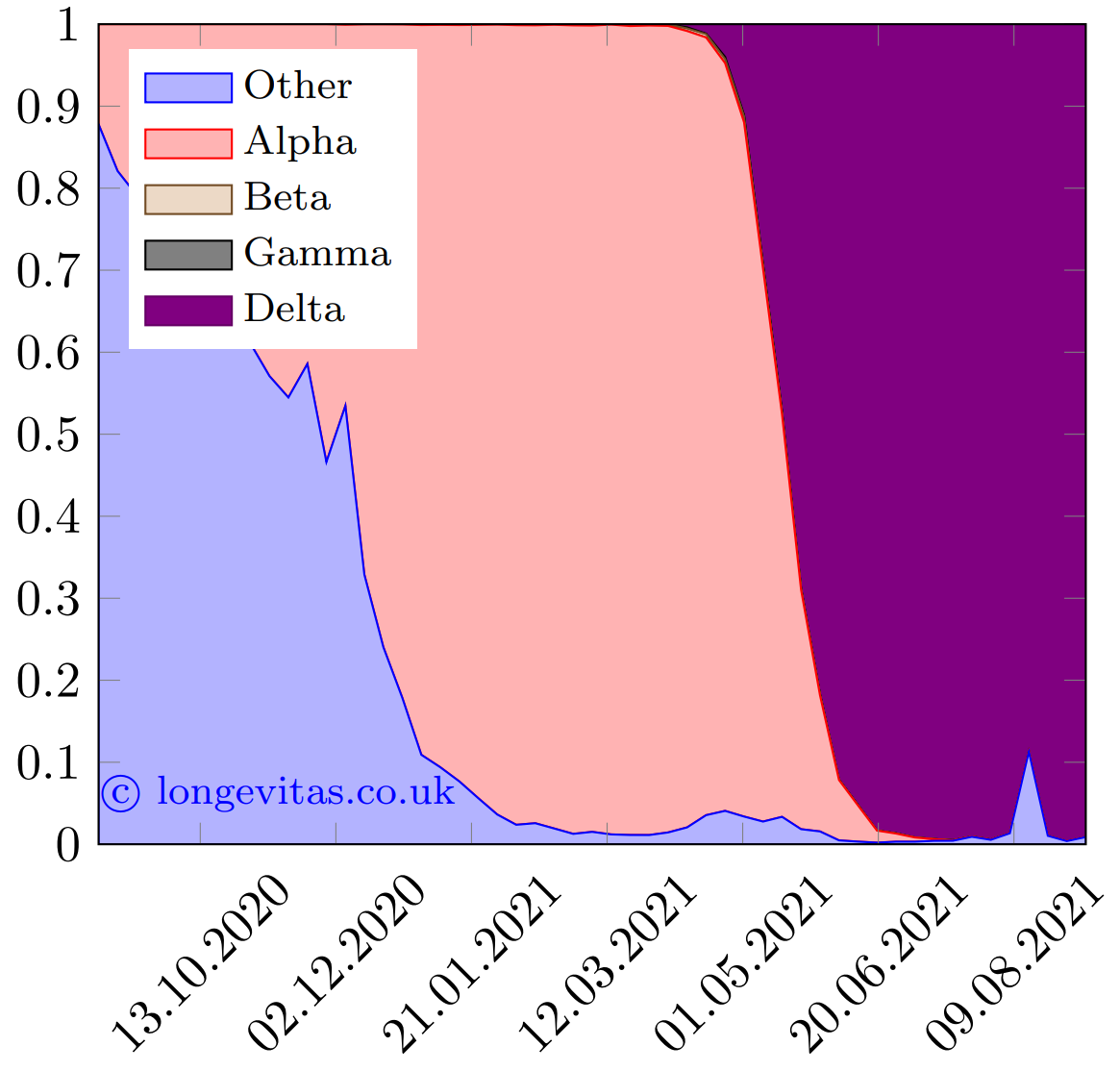(H)arms race
I'm not a fan of the hyperbolic use of military metaphors in civilian life. However, in rare cases they do seem appropriate, and the ongoing SAR-Cov-2 pandemic provides an example. After all, describing a worker as "front-line" seems justified when the occupation carries a materially increased risk of infection and death (SAGE, 2021).
It is often said of military campaigns that the first casualty of battle is your battle plan — the enemy does not stand still, but adapts. Something similar can be said of the SARS-Cov-2 virus, which undergoes continual evolution in the face of all our efforts to combat it. However, unlike historical viral pandemics like the Spanish Influenza of 1918–1920, we have some new tools to understand genomic changes. DNA sequencing allows us to know how the virus evolves over time, as shown in Figure 1.
Figure 1. Proportion of SARS-Cov-2 variants in UK over time. Source: Own calculations using data from Wellcome-Sanger Institute to 4th September 2021 and the variant-classification system from the World Health Organisation.

Figure 1 shows that the Alpha variant took less than a year to become the dominant strain of SAR-Cov-2 in the UK. However, the more infectious Delta variant then took just three months to completely supplant the Alpha variant. (The Beta and Gamma variants never got a look-in.) Another implication of Figure 1 is that the second spike in covid-19 mortality in the UK, peaking in January 2021, was overwhelmingly composed of Alpha-variant infections. In contrast, the first covid-19 spike in April & May 2020 was due to a different variant.
The challenge for humanity is to keep up with the virus — vaccines were developed and tested against pre-Alpha variants of SARS-Cov-2, but mutation and natural selection has since produced two variants with the necessary features to become fully dominant in the UK. Fortunately, Pouwels et al (2021) found that the Pfizer-BioNTech, Oxford-AstraZeneza and Moderna vaccines all provided protection against the Delta variant. Vaccine development against covid-19 was lightning-fast by historic standards, but we must continue to work and live according a timescale determined by the rate of virus evolution. The term "arms race" springs to mind, albeit the arms in question are ones needing jabs.
References:
Pouwels, K. B., Pritchard, E., Matthews, P. C., Stoesser, N., Eyre, D. W., Vihta, K., House, T, Hay, J., Bell, J. I., Newton, J. N., Farrar, J., Crook, D., Cook, D., Rourke, E., Studley, R., Peto, T., Diamond, I. and Walker, A. S. (2021) Impact of Delta on viral burden and vaccine effectiveness against new SARS-CoV-2 infections in the UK, University of Oxford.
Scientific Advisory Group for Emergencies (SAGE) COVID-19 risk by occupation and workplace, 11 February 2021 (Environmental Modelling Group).
Previous posts
No Thanks for the Memory
That there is "no substitute for experience" is a truism, and one that is very tempting to apply wholesale to human immunity. Indeed, we previously touched upon an particular feature of the 1918 Spanish Flu outbreak, the so-called "W-shaped" mortality impact resulting in disproportionate fatalities amongst younger adults in the 20-40 range.
Modelling mortality shocks
The ongoing coronavirus pandemic has so far produced two mortality shocks in the UK and many other countries. Unsurprisingly, the extra mortality is also visible in annuity portfolios. Such mortality spikes create a c


Add new comment